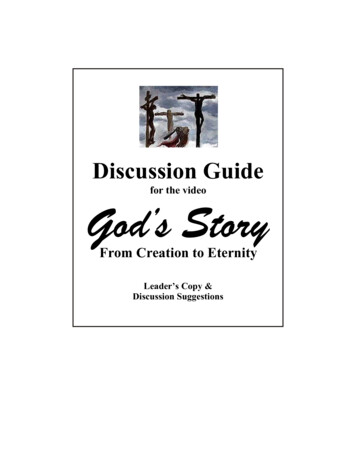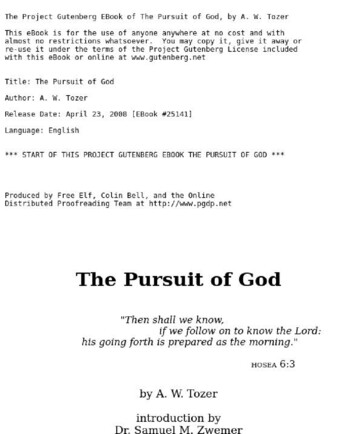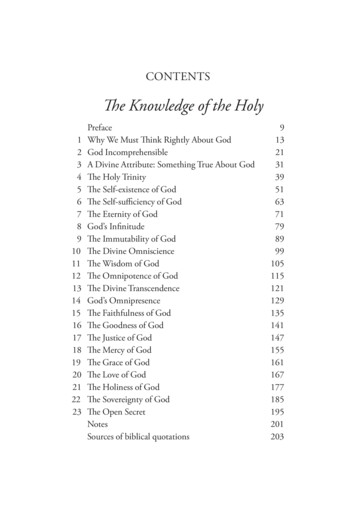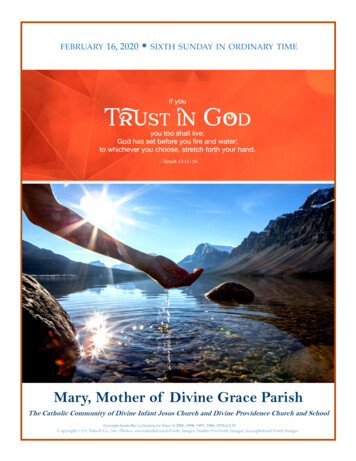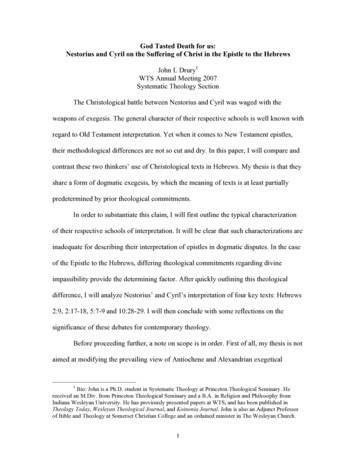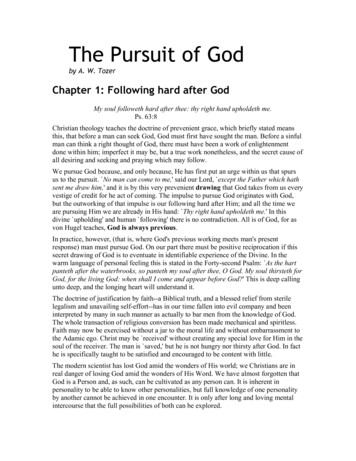
Transcription
The Pursuit of Godby A. W. TozerChapter 1: Following hard after GodMy soul followeth hard after thee: thy right hand upholdeth me.Ps. 63:8Christian theology teaches the doctrine of prevenient grace, which briefly stated meansthis, that before a man can seek God, God must first have sought the man. Before a sinfulman can think a right thought of God, there must have been a work of enlightenmentdone within him; imperfect it may be, but a true work nonetheless, and the secret cause ofall desiring and seeking and praying which may follow.We pursue God because, and only because, He has first put an urge within us that spursus to the pursuit. No man can come to me,' said our Lord, except the Father which hathsent me draw him,' and it is by this very prevenient drawing that God takes from us everyvestige of credit for he act of coming. The impulse to pursue God originates with God,but the outworking of that impulse is our following hard after Him; and all the time weare pursuing Him we are already in His hand: Thy right hand upholdeth me.' In thisdivine upholding' and human following' there is no contradiction. All is of God, for asvon Hugel teaches, God is always previous.In practice, however, (that is, where God's previous working meets man's presentresponse) man must pursue God. On our part there must be positive reciprocation if thissecret drawing of God is to eventuate in identifiable experience of the Divine. In thewarm language of personal feeling this is stated in the Forty-second Psalm: As the hartpanteth after the waterbrooks, so panteth my soul after thee, O God. My soul thirsteth forGod, for the living God: when shall I come and appear before God?' This is deep callingunto deep, and the longing heart will understand it.The doctrine of justification by faith--a Biblical truth, and a blessed relief from sterilelegalism and unavailing self-effort--has in our time fallen into evil company and beeninterpreted by many in such manner as actually to bar men from the knowledge of God.The whole transaction of religious conversion has been made mechanical and spiritless.Faith may now be exercised without a jar to the moral life and without embarrassment tothe Adamic ego. Christ may be received' without creating any special love for Him in thesoul of the receiver. The man is saved,' but he is not hungry nor thirsty after God. In facthe is specifically taught to be satisfied and encouraged to be content with little.The modern scientist has lost God amid the wonders of His world; we Christians are inreal danger of losing God amid the wonders of His Word. We have almost forgotten thatGod is a Person and, as such, can be cultivated as any person can. It is inherent inpersonality to be able to know other personalities, but full knowledge of one personalityby another cannot be achieved in one encounter. It is only after long and loving mentalintercourse that the full possibilities of both can be explored.
All social intercourse between human beings is a response of personality to personality,grading upward from the most casual brush between man and man to the fullest, mostintimate communion of which the human soul is capable. Religion, so far as it is genuine,is in essence the response of created personalities to the Creating Personality, God. Thisis life eternal, that they might know thee, the only true God, and Jesus Christ, whom thouhast sent.' (John 17:3)God is a Person, and in the deep of His mighty nature He thinks, wills, enjoys feels,loves, desires and suffers as any other person may. In making Himself known to us Hestays by the familiar pattern of personality. He communicates with us through the avenuesof our minds, our wills and our emotions. The continuous and unembarrassed interchangeof love and thought between God and the soul of the redeemed man is the throbbing heartof New Testament religion.This intercourse between God and the soul is known to us in conscious personalawareness. It is personal: that is, it does not come through the body of believers, as such,but is known to the individual, and to the body through the individuals which compose it.And it is conscious: that is, it does not stay below the threshold of consciousness andwork there unknown to the soul (as, for instance, infant baptism is thought by some todo), but comes within the field of awareness where the man can know' it as he knowsany other fact of experience.You and I are in little (our sins excepted) what God is in large. Being made in His imagewe have within us the capacity to know Him. In our sins we lack only the power. Themoment the Spirit has quickened us to life in regeneration our whole being senses itskinship to God and leaps up in joyous recognition. That is the heavenly birth withoutwhich we cannot see the Kingdom of God. It is, however, not an end but an inception, fornow begins the glorious pursuit, the heart's happy exploration of the infinite riches of theGodhead. That is where we begin, I say, but where we stop no man has yet discovered,for there is in the awful and mysterious depths of the Triune God neither limit nor end.Shoreless Ocean, who can sound Thee?Thine own eternity is round Thee,Majesty divine!To have found God and still to pursue Him is the soul's paradox of love, scorned indeedby the too-easily- satisfied religionist, but justified in happy experience by the children ofthe burning heart. St. Bernard stated this holy paradox in a musical quatrain that will beinstantly understood by every worshipping soul:We taste Thee, O Thou Living Bread,And long to feast upon Thee still:We drink of Thee, the FountainheadAnd thirst our souls from Thee to fill.come near to the holy men and women of the past and you will soon feel the heat of theirdesire after God. They mourned for Him, they prayed and wrestled and sought for Himday and night, in season and out, and when they had found Him the finding was all thesweeter for the long seeking. Moses used the fact that he knew God as an argument forknowing Him better. Now, therefore, I pray thee, if I have found grace in thy sight, showme now thy way, that I may know thee, that I may find grace in thy sight'; and from there
he rose to make the daring request, I beseech thee, show me thy glory.' God was franklypleased by this display of ardour, and the next day called Moses into the mount, and therein solemn procession made all His glory pass before him.David's life was a torrent of spiritual desire, and his psalms ring with the cry of the seekerand the glad shout oft he finder. Paul confessed the mainspring of his life to be hisburning desire after Christ. That I may know Him,' was the goal of his heart, and to thishe sacrificed everything. Yea doubtless, and I count all things but loss for the excellencyof the knowledge of Christ Jesus my Lord: for whom I have suffered the loss of all things,and do count them but refuse, that I may win Christ' (Phil 3:8).Hymnody is sweet with the longing after God, the God whom, while the singer seeks, heknows he has already found. His track I see and I'll pursue,' sang our fathers only a shortgeneration ago, but that song is heard no more in the great congregation. How tragic thatwe in this dark day have had our seeking done for us by our teachers. Everything is madeto center upon the initial act of accepting' Christ (a term, incidentally, which is not foundin the Bible) and we are not expected thereafter to crave any further revelation of God toour souls. We have been snared in the coils of a spurious logic which insists that if wehave found Him we need no more seek Him. This is set before us as the last word inorthodoxy, and it is taken for granted that no Bible-taught Christian ever believedotherwise. Thus the whole testimony of the worshipping, seeking, singing Church on thatsubject is crisply set aside. The experiential heart- theology of a grand army of fragrantsaints is rejected in favor of a smug interpretation of Scripture which would certainlyhave sounded strange to an Augustine, a Rutherford or a Branierd.In the midst of this great chill there are some, I rejoice to acknowledge, who will not becontent with shallow logic. They will admit the force of the argument, and then turn awaywith tears to hunt some lonely place and pray, O God, show me thy glory.' They want totaste, to touch with their hearts, to see with their inner eyes the wonder that is God.I want deliberately to encourage this mighty longing after God. The lack of it has broughtus to our present low estate. The stiff and wooden quality about our religious lives is aresult of our lack of holy desire. Complacency is a deadly foe of all spiritual growth.Acute desire must be present or there will be no manifestation of Christ to His people. Hewaits to be wanted. Too bad that with many of us He waits so long, so very long, in vain.Every age has its own characteristics. Right now we are in an age of religious complexity.The simplicity which is in Christ is rarely found among us. In its stead are programs,methods, organizations and a world of nervous activities which occupy time and attentionbut can never satisfy the longing of the heart. The shallowness of our inner experience,the hollowness of our worship, and the servile imitation of the world which marks ourpromotional methods all testify that we, in this day, know God only imperfectly, and thepeace of God scarcely at all.If we would find God amid all the religious externals we must first determine to findHim, and then proceed in the way of simplicity. Now as always God discovers Himself to babes' and hides Himself in thick darkness from the wise and the prudent. We mustsimplify our approach to Him. We must strip down to essentials (and they will be foundto be blessedly few). We must put away all effort to impress, and come with the guilelesscandor of childhood. If we do this, without doubt God will quickly respond.
When religion has said its last word, there is little that we need other than God Himself.The evil habit of seeking God-and effectively prevents us from finding God in fullrevelation. In the and' lies our great woe. If we omit the and', we shall soon find God,and in Him we shall find that for which we have all our lives been secretly longing.We need not fear that in seeking God only we may narrow our lives or restrict themotions of our expanding hearts. The opposite is true. We can well afford to make Godour All, to concentrate, to sacrifice the many for the One.The author of the quaint old English classic, The Cloud of Unknowing, teaches us how todo this. Lift up thine heart unto God with a meek stirring of love; and mean Himself, andnone of His goods. And thereto, look thee loath to think on aught but God Himself. Sothat nought work in thy wit, nor in thy will, but only God Himself. This is the work of thesoul that most pleaseth God.'Again, he recommends that in prayer we practice a further stripping down of everything,even of our theology. For it sufficeth enough, a naked intent direct unto God without anyother cause than Himself.' Yet underneath all his thinking lay the broad foundation ofNew Testament truth, for he explains that by Himself' he means God that made thee,and bought thee, and that graciously called thee to thy degree.' And he is all forsimplicity: If we would have religion lapped and folden in one word, for that thoushouldst have better hold thereupon, take thee but a little word of one syllable: for so it isbetter than of two, for even the shorter it is the better it accordeth with the work of theSpirit. And such a word is this word God or this word love.'When the Lord divided Canaan among the tribes of Israel, Levi received no share of theland. God said to him simply, I am thy part and thine inheritance,' and by those wordsmade him richer than all his brethren, richer than all the kings and rajas who have everlived in the world. And there is a spiritual principle here, a principle still valid for everypriest of the Most High God.The man who has God for his treasure has all things in One. Many ordinary treasures maybe denied him, or if he is allowed to have them, the enjoyment of them will be sotempered that they will never be necessary to his happiness. Or if he must see them go,one after one, he will scarcely feel a sense of loss, for having the Source of all things hehas in One all satisfaction, all pleasure, all delight. Whatever he may lose he has actuallylost nothing, for he now has it all in One, and he has it purely, legitimately and forever.O God, I have tasted Thy goodness, and it has both satisfied me and made me thirsty formore. I am painfully conscious of my need of further grace. I am ashamed of my lack ofdesire. O God, the Triune God, I want to want Thee; I long to be filled with longing; Ithirst to be made more thirsty still. Show me Thy glory, I pray Thee, that so I may knowThee indeed. Begin in mercy a new work of love within me. Say to my soul, Rise up, mylove, my fair one, and come away.' Then give me grace to rise and follow Thee up fromthis misty lowland where I have wandered so long. In Jesus' name, Amen.Chapter 2 : The Blessedness of Posessing NothingBlessed are the poor in spirit: for theirs is the kingdom of heaven.Matt. 5:3
Before the Lord God made man upon the earth He first prepared for him by creating aworld of useful and pleasant things for his sustenance and delight. In the Genesis accountof the creation these are called simply things.' They were made for man's uses, but theywere meant always to be external to the man and subservient to him. In the deep heart ofthe man was a shrine where none but God was worthy to come. Within him was God;without, a thousand gifts which God had showered upon him.But sin has introduced complications and has made those very gifts of God a potentialsource of ruin to the soul.Our woes began when God was forced out of His central shrine and things' were allowedto enter. Within the human heart things' have taken over. Men have now by nature nopeace within their hearts, for God is crowned there no longer, but there in the moral duskstubborn and aggressive usurpers fight among themselves for first place on the throne.This is not a mere metaphor, but an accurate analysis of our real spiritual trouble. There iswithin the human heart a tough fibrous root of fallen life whose nature is to possess,always to possess. It covets things' with a deep and fierce passion. The pronouns my'and mine' look innocent enough in print, but their constant and universal use issignificant. They express the real nature of the old Adamic man better than a thousandvolumes of theology could do. They are verbal symptoms of our deep disease. The rootsof our hearts have grown down into things, and we dare not pull up one rootlet lest wedie. Things have become necessary to us, a development never originally intended. God'sgifts now take the place of God, and the whole course of nature is upset by the monstroussubstitution.Our Lord referred to this tyranny of things when He said to His disciples, If any manwill come after me, let him deny himself, and take up his cross, and follow me. Forwhosoever will save his life shall lose it: and whosoever shall lose his life for my sakeshall find it.' (Matt. 16:24-25).Breaking this truth into fragments for our better understanding, it would seem that there iswithin each of us an enemy which we tolerate at our peril. Jesus called it life' and self,'or as we would say, the self-life. Its chief characteristic is its possessiveness: the words gain' and profit' suggest this. To allow this enemy to live is in the end to lose everything.To repudiate it and give up all for Christ's sake is to lose nothing at last, but to preserveeverything unto life eternal. And possibly also a hint is given here as to the only effectiveway to destroy this foe: it is by the Cross: Let him take up his cross and follow me.'The way to deeper knowledge of God is through the lonely valleys of soul poverty andabnegation of all things. The blessed ones who possess the Kingdom are they who haverepudiated every external thing and have rooted from their hearts all sense of possessing.They are poor in spirit.' They have reached an inward state paralleling the outwardcircumstances of the common beggar in the streets of Jerusalem; that is what the word poor' as Christ used it actually means. These blessed poor are no longer slaves to thetyranny of things. They have broken the yoke of the oppressor; and this they have donenot by fighting but by surrendering. Though free from all sense of possessing, they yetpossess all things. Theirs is the kingdom of heaven.'Let me exhort you to take this seriously. It is not to be understood as mere Bible teachingto be stored away in the mind along with an inert mass of other doctrines. It is a marker
on the road to greener pastures, a path chiseled against the steep sides of the mount ofGod. We dare not try to by-pass it if we would follow on in this holy pursuit. We mustascend a step at a time. If we refuse one step we bring our progress to an end.As is frequently true, this New Testament principle of spiritual life finds its bestillustration in the Old Testament. In the story of Abraham and Isaac we have a dramaticpicture of the surrendered life as well as an excellent commentary on the first Beatitude.Abraham was old when Isaac was born, old enough indeed to have been his grandfather,and the child became at once the delight and idol of his heart. From that moment when hefirst stooped to take the tiny form awkwardly in his arms he was an eager love slave of hisson. God went out of His way to comment on the strength of this affection. And it is nothard to understand. The baby represented everything sacred to his father's heart: thepromises of God, the covenants, the hopes of the years and the long messianic dream. Ashe watched him grow from babyhood to young manhood the heart of the old man wasknit closer and closer with the life of his son, till at last the relationship bordered upon theperilous. It was then that God stepped in to save both father and son from theconsequences of an uncleansed love. Take now thy son,' said God to Abraham, thine only son Isaac, whom thou lovest, andget thee into the land of Moriah; and offer him there for a burnt-offering upon one of themountains which I will tell thee of.' (Gen 22:2) The sacred writer spares us a close-up ofthe agony that night on the slopes near Beersheba when the aged man had it out with hisGod, but respectful imagination may view in awe the bent form and convulsive wrestlingalone under the stars. Possibly not again until a Greater than Abraham wrestled in theGarden of Gethsemane did such mortal pain visit a human soul. If only the man himselfmight have been allowed to die. That would have been easier a thousand times, for hewas old now, and to die would have been no great ordeal for one who had walked so longwith God. Besides, it would have been a last sweet pleasure to let his dimming vision restupon the figure of his stalwart son who would live to carry on the Abrahamic line andfulfill in himself the promises of God made long before in Ur of the Chaldees.How should he slay the lad! Even if he could get the consent of his wounded andprotesting heart, how could he reconcile the act with the promise, In Isaac shall thy seedbe called'? This was Abraham's trial by fire, and he did not fail in the crucible. While thestars still shone like sharp white points above the tent where the sleeping Isaac lay, andlong before the gray dawn had begun to lighten the east, the old saint had made up hismind. He would offer his son as God had directed him to do, and then trust God to raisehim from the dead. This, says the writer to the Hebrews, was the solution his achingheart found sometime in the dark night, and he rose early in the morning' to carry out theplan. It is beautiful to see that, while he erred as to God's method, he had correctly sensedthe secret of His great heart. And the solution accords well with the New TestamentScripture, Whosoever will lose. for my sake shall find.'God let the suffering old man go through with it up to the point where He knew therewould be no retreat, and then forbade him to lay a hand upon the boy. To the wonderingpatriarch He now says in effect, It's all right, Abraham. I never intended that you shouldactually slay the lad. I only wanted to remove him from the temple of your heart that Imight reign unchallenged there. I wanted to correct the perversion that existed in yourlove. Now you may have the boy, sound and well. Take him and go back to your tent.
Now I know that thou fearest God, seeing that thou hast not withheld thy son, thine onlyson, from me.'Then heaven opened and a voice was heard saying to him, By myself I have sworn, saiththe Lord, for because thou hast done this thing, and hast not withheld thy son, thine onlyson: that in blessing I will bless thee, and in multiplying I will multiply thy seed as thestars of the heaven, and as the sand which is upon the sea shore; and thy seed shallpossess the gate of his enemies; and in thy seed shall all the nations of the earth beblessed; because thou hast obeyed my voice.'The old man of God lifted his head to respond to the Voice, and stood there on the mountstrong and pure and grand, a man marked out by the Lord for special treatment, a friendand favorite of the Most High. Now he was a man wholly surrendered, a man utterlyobedient, a man who possessed nothing. He had concentrated his all in the person of hisdear son, and God had taken it from him. God could have begun out on the margin ofAbraham's life and worked inward to the center; He chose rather to cut quickly to theheart and have it over in one sharp act of separation. In dealing thus He practiced aneconomy of means and time. It hurt cruelly, but it was effective.I have said that Abraham possessed nothing. Yet was not this poor man rich? Everythinghe had owned before was still his to enjoy: sheep, camels, herds, and goods of every sort.He had also his wife and his friends, and best of all he had his son Isaac safe by his side.He had everything, but he possessed nothing. There is the spiritual secret. There is thesweet theology of the heart which can be learned only in the school of renunciation. Thebooks on systematic theology overlook this, but the wise will understand.After that bitter and blessed experience I think the words my' and mine' never had againthe same meaning for Abraham. The sense of possession which they connote was gonefrom his heart. things had been cast out forever.They had now become external to theman. His inner heart was free from them. The world said, Abraham is rich,' but the agedpatriarch only smiled. He could not explain it to them, but he knew that he ownednothing, that his real treasures were inward and eternal.There can be no doubt that this possessive clinging to things is one of the most harmfulhabits in the life. Because it is so natural it is rarely recognized for the evil that it is; butits outworkings are tragic. We are often hindered from giving up our treasures to the Lordout of fear for their safety; this is especially true when those treasures are loved relativesand friends. But we need have no such fears. Our Lord came not to destroy but to save.Everything is safe which we commit to Him, and nothing is really safe which is not socommitted.Our gifts and talents should also be turned over to Him. They should be recognized forwhat they are, God's loan to us, and should never be considered in any sense our own. Wehave no more right to claim credit for special abilities than for blue eyes or strongmuscles. For who maketh thee to differ from another? and what hast thou that thou didstnot receive?'The Christian who is alive enough to know himself even slightly will recognize thesymptoms of this possession malady, and will grieve to find them in his own heart. If thelonging after God is strong enough within him he will want to do something about thematter. Now, what should he do?
First of all he should put away all defense and make no attempt to excuse himself eitherin his own eyes or before the Lord. Whoever defends himself will have himself for hisdefense, and he will have no other; but let him come defenseless before the Lord and hewill have for his defender no less than God Himself. Let the inquiring Christian trampleunder foot every slippery trick of his deceitful heart and insist upon frank and openrelations with the Lord.Then he should remember that this is holy business. No careless or casual dealings willsuffice. Let him come to God in full determination to be heard. Let him insist that Godaccept his all, that He take things out of his heart and Himself reign there in power. Itmay be he will need to become specific, to name things and people by their names one byone. If he will become drastic enough he can shorten the time of his travail from years tominutes and enter the good land long before his slower brethren who coddle their feelingsand insist upon caution in their dealings with God.Let us never forget that such a truth as this cannot be learned by rote as one would learnthe facts of physical science. They must be experienced before we can really know them.We must in our hearts live through Abraham's harsh and bitter experiences if we wouldknow the blessedness which follows them. The ancient curse will not go out painlessly;the tough old miser within us will not lie down and die obedient to our command. Hemust be torn out of our heart like a plant from the soil; he must be extracted in agony andblood like a tooth from the jaw. He must be expelled from our soul by violence as Christexpelled the money changers from the temple. And we shall need to steel ourselvesagainst his piteous begging, and to recognize it as springing out of self-pity, one of themost reprehensible sins of the human heart.If we would indeed know God in growing intimacy we must go this way of renunciation.And if we are set upon the pursuit of God He will sooner or later bring us to this test.Abraham's testing was, at the time, not known to him as such, yet if he had taken somecourse other than the one he did, the whole history of the Old Testament would have beendifferent. God would have found His man, no doubt, but the loss to Abraham would havebeen tragic beyond the telling. So we will be brought one by one to the testing place, andwe may never know when we are there. At that testing place there will be no dozenpossible choices for us; just one and an alternative, but our whole future will beconditioned by the choice we make.Father, I want to know Thee, but my coward heart fears to give up its toys. I cannot partwith them without inward bleeding, and I do not try to hide from Thee the terror of theparting. I come trembling, but I do come. Please root from my heart all Those thingswhich I have cherished so long and which have become a very part of my living self, sothat Thou mayest enter and dwell there without a rival. Then shalt Thou make the placeof Thy feet glorious. Then shall my heart have no need of the sun to shine in it, forThyself wilt be the light of it, and there shall be no night there. In Jesus' name, Amen.Chapter 3: Removing the VeilHaving therefore, brethren, boldness to enter into the holiest by the bloodof Jesus.
Heb. 10:19Among the famous sayings of the Church fathers none is better know than Augustine's Thou hast formed us for Thyself, and our hearts are restless till they find rest in Thee.'The great saint states here in few words the origin and interior history of the human race.God made us for Himself: that is the only explanation that satisfies the heart of athinking man, whatever his wild reason may say. Should faulty education and perversereasoning lead a man to conclude otherwise, there is little that any Christian can do forhim. For such a man I have no message. My appeal is addressed to those who have beenpreviously taught in secret by the wisdom of God; I speak to thirsty hearts whose longingshave been wakened by the touch of God within them,and such as they need no reasonedproof. Their restless hearts furnish all the proof they need.God formed us for Himself. The shorter catechism, Agreed upon by the ReverendAssembly of Divines at Westminister,' as the old New-England Primer has it, asks theancient questions what and why and answers them in one short sentence hardly matchedin any uninspired work. Question: What is the chief End of Man? Answer: Man's chiefEnd is to glorify God and enjoy Him forever.' With this agree the four and twenty elderswho fall on their faces to worship Him that liveth for ever and ever, saying, Thou artworthy, O Lord, to receive glory and honour and power: for thou hast created all things,and for thy pleasure they are and were created.' (Rev 4:11)God formed us for His pleasure, and so formed us that we as well as He can in divinecommunion enjoy the sweet and mysterious mingling of kindred personalities. He meantus to see Him and live with Him and draw our life from His smile. But we have beenguilty of that foul revolt' of which Milton speaks when describing the rebellion of Satanand his hosts. We have broken with God. We have ceased to obey Him or love Him andin guilt and fear have fled as far as possible from His Presence.Yet who can flee from His Presence when the heaven of heavens cannot contain Him?when as the wisdom of Solomon testifies, the Spirit of the Lord filleth the world'? Theomnipresence of the Lord is one thing, and is a solemn fact necessary to His perfection;the manifest Presence is another thing altogether, and from that Presence we have fled,like Adam, to hide among the trees of the garden, or like Peter to shrink away crying, Depart from me, for I am a sinful man, O Lord.' So the life of man upon the earth is alife away from the Presence, wrenched loose from that blissful cent
The Pursuit of God by A. W. Tozer Chapter 1: Following hard after God My soul followeth hard after thee: thy right hand upholdeth me. Ps. 63:8 Christian theology teaches the doctrine of prevenient grace, which briefly stated means this, that before a man can seek God, God must first have sought the man. Before a sinful


